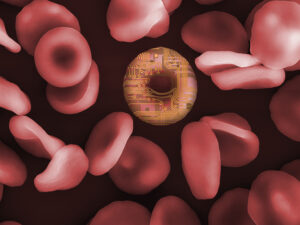Over 10 million of RBC units are transfused each year in the U.S. alone. Alloimmunization and hemolytic transfusion reactions pose a special challenge for those patients who are chronically transfused. While there are more than 350 RBC antigens identified, the Rh locus is highly immunogenic and has hundreds of variants owing to the large number of single-nucleotide polymorphisms, gene rearrangements and variable expression of the gene. Alloantibody screening and identification usually requires multiple antigen negative and positive RBCs from different donors, and up to one-third of antibodies can be missed by standard detection methods because of the lack of appropriate RBCs with uncommon antigen phenotypes. In order to overcome these obstacles, researchers genetically edited and reprogrammed human induced pluripotent stem cells to generate RBCs (iRBCs) with 10 rare Rh phenotypes including Rh null, D–, Goa+, and DAK that are compatible with gel column agglutination assays in pre-transfusion work-ups. While these iRBCs are renewable and could potentially provide an unlimited progenitor source of universal RBCs, significant hurdles for culturing and storing large amounts of these cells must be overcome. Many chronically transfused patients, however, should benefit from the precise alloantibody identification that these iRBCs provide.
References:

